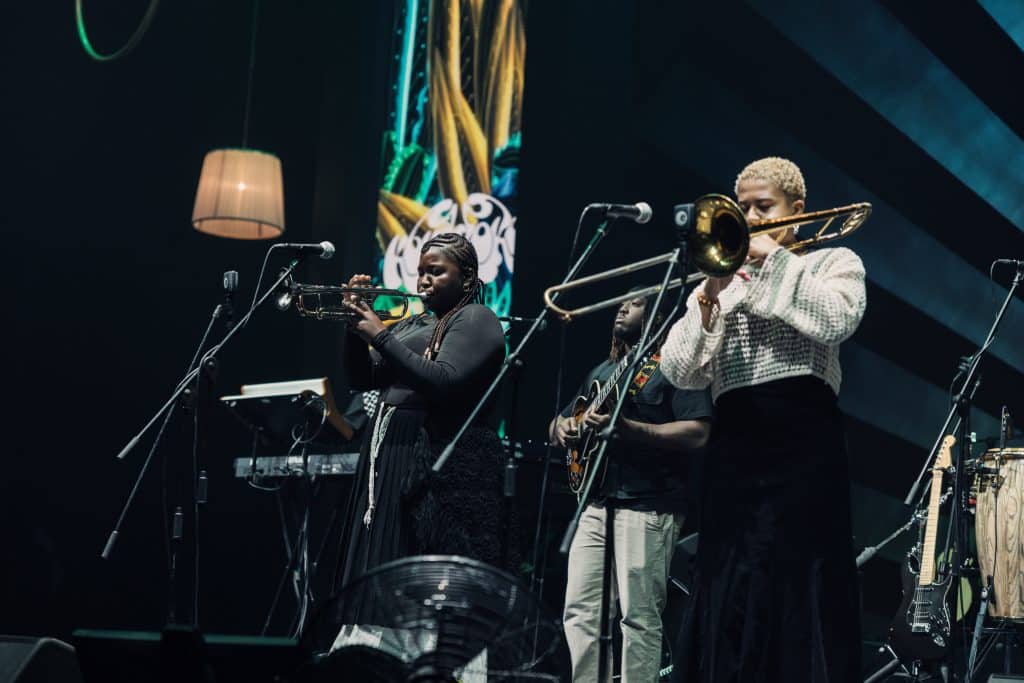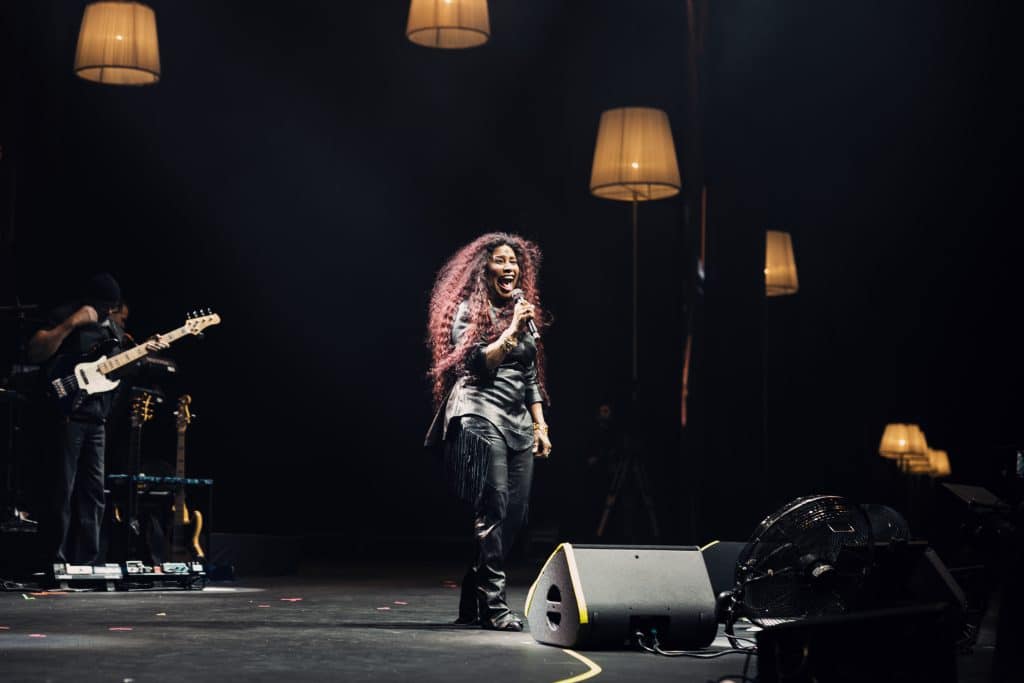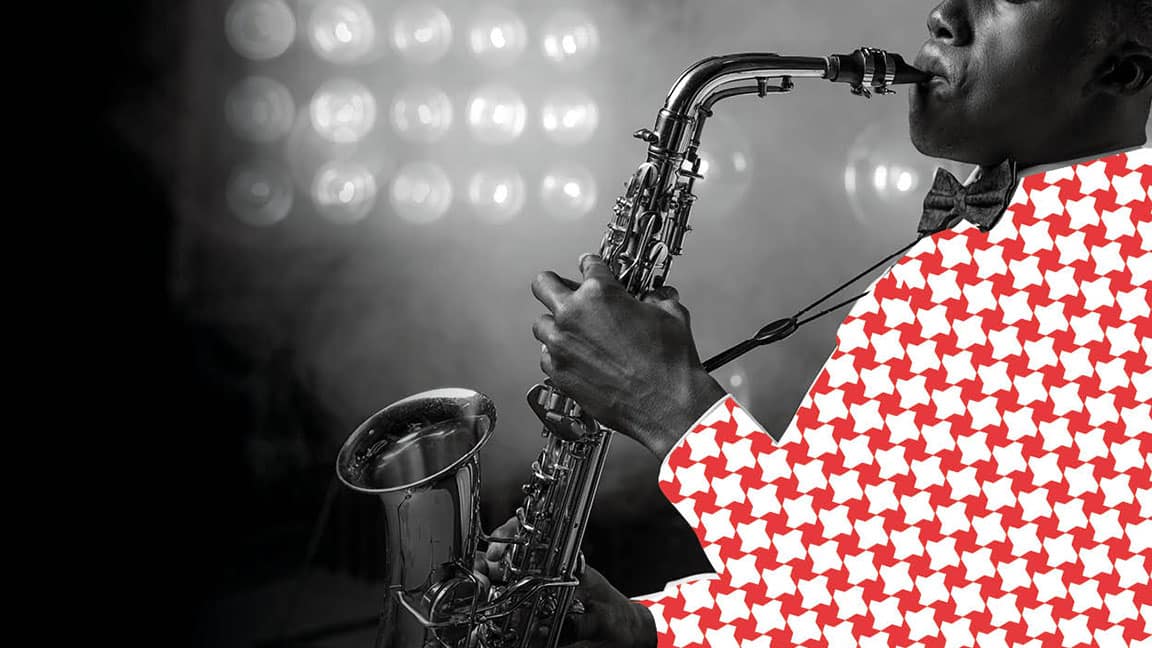The first Riyadh International Jazz Festival set the tone for the musical transformation coming to Saudi Arabia. From jazz under a night sky to joining the dots between genres old and new, it’s all part of a big picture that’s now coming into focus. We take a closer look…
On the outskirts of Riyadh, under a canopy of stars in the Arabian sky, a transformative note echoed through the city’s air in February 2024. As the inaugural Riyadh International Jazz Festival wound down, the final strains of the music faded, and a delighted crowd went home.
The Mayadeen Theatre in Diriyah was the scene of three days of jazz in all its forms, a pioneering event marking a pivotal moment in Saudi Arabia’s cultural renaissance. While Chaka Khan may have been the marquee name, the festival brought together a diverse blend of jazz virtuosos both local and international, enchanting the audience with the vibrant sounds of improvisation and cultural fusion. TrapHouseJazz, jazz-funk, soul, synthpop—this was a showcase of jazz’s wonderful breadth and scope.
That line-up was no happy accident. It was the work of Paul Pacifico, CEO of the Music Commission, under the Ministry of Culture of Saudi Arabia. A man with music in his bones—and a harmonica in his suit jacket pocket—Pacifico is charged with transforming Saudi Arabia’s music sector from the ground up. A session musician, a jazz lover and a visionary music industry executive with a CV that includes a six-year stint as CEO of AIM, the Association of Independent Music, Pacifico has the chops for the job. Just as importantly, he has the passion, as he reveals when reflecting on the success of the Ministry of Culture’s first ever jazz festival.

“There’s something beautiful about the obvious correlations between creative iterations of jazz and Saudi’s Vision plans,” Pacifico remarks, emphasising the parallel between the improvisational nature of jazz and the dynamic shifts happening in the Kingdom. The Riyadh International Jazz Festival was more than a mere musical showcase; it was a gateway to explore the intricate interplay between tradition and modernity, echoing the nation’s vast historical tapestry.
For Pacifico, the ideal collaborators in this journey are those with a real desire to discover the region, seeking an exchange that in a way that leaves a lasting impact. He draws parallels with jazz as a musical conversation – an improvised moment where artists engage in a dialogue through music. This, he believes, mirrors the essence of cultural exchange, where mutual understanding and curiosity lay the foundation for lasting partnerships.
Reflecting on the festival, Pacifico highlights its experimental nature, testing the waters for Saudi Arabia’s appetite for jazz. The festival’s diverse lineup challenged preconceptions of what jazz is, mirroring global festivals like Montreux but with more onus on reflecting the emerging Saudi scene. The festival’s success demonstrated the curiosity and openness of
the Saudi audience, while the international artists, perhaps unfamiliar with the nuances of Saudi society, delighted in performing in the Kingdom. This gave rise to genuine cultural exchanges, wiping away the simplistic narrative of a stop-off in Saudi Arabia as merely a financial opportunity.

“The event was a first, it was a pilot,” says Pacifico.
“So it was kind of breaking ground. We knew that there were some Saudis playing jazz. We knew that there were some Saudis that like jazz. And we got to the point where we thought, okay, we have to take a risk and do this. The big takeaway for me was the excitement and relief to see how culturally curious lots of the crowd were. I think the majority of people that came to that festival had no idea who the artists were, other than maybe Chaka Khan. And we deliberately programmed a lineup that was very diverse and eclectic in terms of different aspects and approaches to jazz, stretching ideas of what is jazz right now in the 21st century.”
It wasn’t just about performances, however. As part of the Music Commission’s mission, it was important that the invited guests engaged with the Saudi audience beyond the music. This allowed artists to connect with local students and emerging talents through Q&A sessions and community events. As Pacifico puts it, “It’s about people who are genuinely culturally curious and people who are genuinely looking for an exchange. People who are saying, ‘I can add value. I can bring stuff. I can trade with you.’ Whatever the driver might be. ‘But at the same time, I’m really interested in understanding what’s going on. I’m really interested in understanding what I can learn too. What you can tell me?’”
In the global conversation about Saudi Arabia, Paul Pacifico aims to shatter two major misconceptions —the oversight of the Kingdom’s profound cultural transformation and the reduction of the dialogue to financial terms. The Riyadh International Jazz Festival and similar events serve as a bridge, connecting international artists with the multifaceted stories and musical mosaic of Saudi Arabia. In a society evolving at the intersection of tradition and progress, the harmonious notes of jazz resonate not only as a musical genre but as a metaphor for the cultural evolution unfolding in Saudi Arabia.

One of the key initiatives spearheaded by the Music Commission is the collaboration with UNESCO and the Saudi Heritage Preservation Society on a project called Saudi Trouq—a journey through the 13 regions of Saudi Arabia, each with its unique music, traditional dress and cuisine. Paul Pacifico draws a comparison to the legendary Alan Lomax recordings that laid the foundation for Moby’s album Play, emphasising the importance of documenting and preserving the manifold cultural heritage woven into Saudi Arabia’s vast and varied landscapes. Much like Lomax, an ethnomusicologist who documented early blues and folk for the Library of Congress, the Saudi Trouq project chronicles and celebrates the healthy but often hidden musical history of Saudi Arabia.
“It really is a huge reminder that we are standing on the shoulders of ancient civilisations,” Pacifico reflects. Saudi Arabia, often misconceived as a monolithic sand-dominated entity, is in fact a mosaic of mountains occasionally dusted with snow, verdant forests, white-sand beaches, a little-celebrated landscape that acts as the backdrop to an equally intricate cultural medley that extends deep into history. Pacifico’s endeavour to record this cultural abundance mirrors the essence of jazz—an improvisational dialogue between the past and the present.
The Music Commission’s role extends beyond capturing the echoes of ancient traditions and piecing together jazz festivals. It’s also actively fostering the emergence of a vibrant contemporary music scene, with the full support of Saudi Arabia’s Minister of Culture, HH Prince Badr bin Abdullah bin Farhan Al Saud. Paul Pacifico shares anecdotes about encounters with modern icons like Gigi Arabia, the founder of Heavy Arabia, a platform dedicated to Saudi metal. Ahead of the current modernisation strategy, she was already reaching out online to Viking metal producers in Denmark and Norway, forging connections that have now manifested in the Saudi metal scene gaining international recognition. At the same time, the Kingdom has hosted huge and respected international acts like Metallica in Riyadh.

The juxtaposition of experiences in Riyadh, from live entertainment in modern venues to attending concerts by Arabic music icons, reflects the nuanced duality of Saudi society. “There is a spectrum that we overlook,” Pacifico notes, emphasising that, like any other society, Saudi Arabia is home to hybrid tastes and scenes that coexist, persist and evolve. Jazz, metal, rap, soul, pop and more traditional forms all have their own ecosystems.
Navigating the uncharted waters of promoting culture as a way of life, enabling culture to contribute to economic growth, and creating opportunities for global cultural exchange through the medium of music is a very real challenge, and Paul Pacifico recognises the need for nuance. “Complex challenges require complex solutions,” he says, cautioning against the allure of quick fixes. The evolution of Saudi Arabia’s contemporary music ecosystem, deeply rooted in its Vision 2030 programme, encompasses social, economic and national pillars.
The goal is to encourage a vibrant society, a thriving economy and a proud nation, all unified by the life-affirming power of music. It would be easy to take a western-dominated approach to this, but Pacifico resists that, putting together a young, multi-skilled team that is 95% Saudi, a 50-50 mix of men and women. “That goes from the most senior positions in the team down to the most junior,” Pacifico stresses. “They’re very diverse culturally, a fantastic range of views I can call on to help inform decision making in a really good way.”
Pacifico envisions an all-encompassing approach to music development, encapsulated in Riyadh Music Week. An ambitious event aiming to bring together numerous elements of the music calendar, offering a week-long celebration connecting the XP Music Futures to Soundstorm that spans showcases, events and conferences. “It represents the closest thing to a single holistic expression of everything we’re trying to do,” Pacifico explains, emphasising the need for all pillars to reinforce each other in the intricate interplay of Saudi Arabia’s masterplan for cultural expansion.

“My ideal moment for Saudi, from a music perspective, is something we’re working on for the end of this year, which is a Riyadh Music Week. It’s bringing together a lot of the key tentpole moments in the music calendar, condensing them into one week of activity. There will be lots of things for lots of people. It will be consumer-facing in some aspects. There’ll be festival moments, events moments. There’ll be conferences and summits going on during the day and in the background, which will be all about getting the infrastructure of music right and the architecture of the sector in place,” he shared.
That architecture isn’t thrown up overnight. After all, in a nation that hasn’t hosted many international artists or huge festivals, seemingly mundane questions take on huge import. Where do you get all the amplifiers from? How do you source all the security barriers? Are there enough staff available who can run an event of that scale. And this is all part of the Music Commission’s big picture approach to the scene. It’s also a big reason that they chose Pacifico for the role —a person who is as comfortable jamming on stage as he is thrashing out far-reaching policy in the boardroom.
“We can talk about the breadth of the mandate,” he says, “but it’s kind of doing everything all at once to further develop the music ecosystem. So it requires knowledge of policy, knowledge of copyright and the law, knowledge of how all the moving parts of the music industry intersect and fit together. If you pull on a thread on one side, it makes a whole bunch of other things go wrong. So understanding that complex dynamic, the negotiation between digital platforms, how do people get royalties, the music industry itself, the wider creative landscape, the education system, both academic learning and practitioner-led lifelong learning and music in the community. And then, finally, the commercial structures and how they work. How to support ambitious new starter record labels or publishing companies, let alone artists and songwriters that are trying to develop careers. The whole spectrum of what’s going to make sense to create a kind of sustainable ecosystem.”
He compares it to a jigsaw puzzle where some of the pieces aren’t just waiting to be slotted in but are completely missing. How can you fill the gaps while supporting and reinforcing what’s already there? Fancy a more sporting metaphor? The Music Commission is ensuring there’s a pitch for a game to be played on, but also refereeing that game at the same time. Fundamentally, however, it’s about making the sector, not being the sector, a point that Pacifico is keen to stress.
It’s a lot of balls to juggle, but the success of the Riyadh International Jazz Festival and other elements of the Music Commission’s work show that it’s working. That includes not just the audience, but also the visiting artists. YolanDa Brown, the award-winning musician who graced the stage at Mayadeen, talks about how she, “played a bit of Bob Marley because my parents are from Jamaica and the audience in Riyadh sang louder than some of the audiences I’ve played around the world.” She also feels that she got a lot out of the experience artistically. “What I really loved about the festival when they first told me about it, that mixing of the cultures, making sure that we had clear musical exchange, and it was brilliant. I can’t wait to hear more and go back.”
It’s clear that the Riyadh International Jazz Festival is another key catalytic event in the modern story of Saudi music. It’s also clear it doesn’t exist in isolation. When jazz artists improvise, they do so over a steady, subtle, sometimes almost imperceptible backdrop. It might be a recurring bass note, a simple piano motif, but it never goes away. On top of that, the artists each take their turn to shine, the spotlight picking them out as they hit their solo straps. That backdrop is Saudi’s long musical history, whether storied or unsung, and we’re keen to see what the artists building the future will do with their time as they carve out their own notes.
